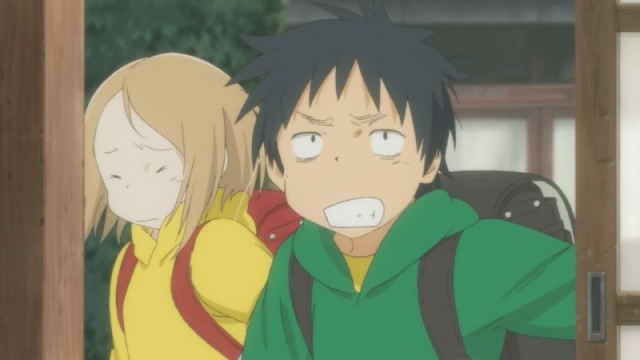
Gather round, everyone, it’s story time. You might remember I used to teach English in Japan. Well, that brought me into contact with a wide variety of students, among them several dozen pre-schoolers. And it is here that our story takes place…
First of all, let me introduce you to Kouki. At the time these events unfolded Kouki was three, possibly four years old, and he resembled nothing so much as a friendly, flat-faced, sturdy little bear. He didn’t say much but he was always willing to have a go at pretty much anything, and he had an air of good-humour about him that I found hard to resist.
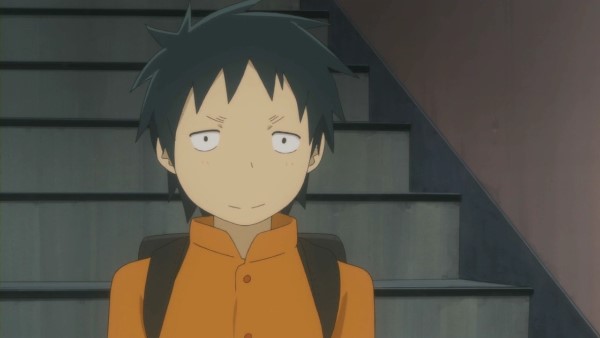
You might want to imagine him like this.
The next player in our little drama is Keiko. Keiko was three years old, and about as sweet, shy, and inoffensive as it is realistically possible for a Japanese pre-schooler to be (which, given what they’re like in general, is saying a good deal). Keiko was a temporary student, attending classes for a few weeks while her parents were in the area for some work-related reason.
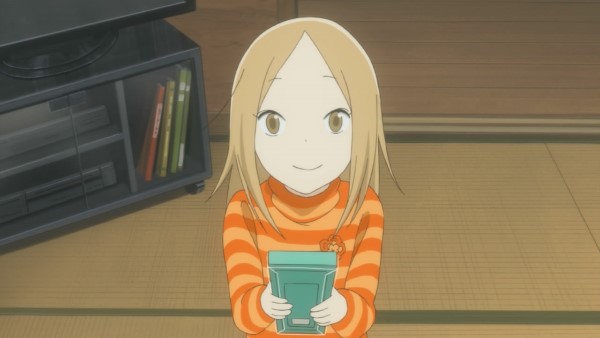
Meet Keiko.
Finally, there’s one more character you need to know. I can’t remember his real name, but I don’t actually feel too bad about that because he will be forever marked in my memory as ‘Biter’; and believe me, he richly deserved that name.
Biter had developed the habit of biting people as a means of expressing his displeasure, and for reasons best known to themselves his parents hadn’t been able to put a stop to it. To make matters worse, he was also a bully. His pursuit of this had been limited somewhat by the fact that he was smaller than most of the other kids, but his willingness to bite evened things out. All of the teachers were keeping a careful eye on Biter, but so far we hadn’t managed to stop him from bullying the other kids if he thought he could get away with it.
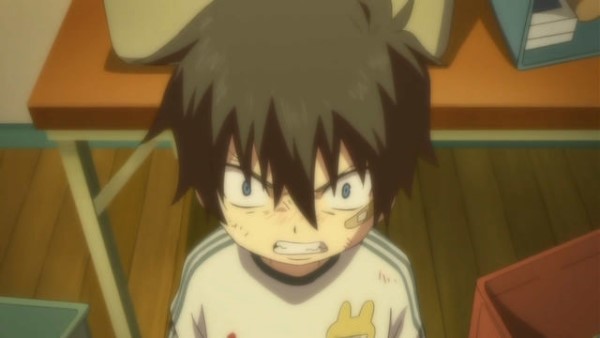
To be fair, he didn’t look quite this angry. Not all the time, anyway.
Anyway, we had reached the midday playtime and I was doing my usual routine of wandering around, talking with the kids in English and taking part in their games where I could (which was more difficult than you might think, pre-schoolers have boundless energy at times). Keiko was playing with the cooking toys and had managed to set up what looked a lot like a small restaurant for some of the stuffed animals. Unfortunately, right about then Biter decided that he wanted Mrs Dog for his own purposes.
Not being well-versed in the finer points of communication, he did this in the most expeditious manner he could – he made a grab for stuffed toy. Keiko, however, had just promoted Mrs Dog to head chef in the restaurant, which required changing her work location, and so Biter’s grab caught nothing but air.
From the other side of the room I could almost see the thoughts going through Biter’s mind: she moved the toy I wanted, I’m going to get it and teach her that it’s my toy. And he did this exactly how you’d imagine: he marched up to Keiko, snatched the toy from her grip, and bit her arm just to make sure the lesson was learned.
Poor Keiko didn’t protest, but her face crumpled and tears welled up in her eyes. I was on my feet in an instant, about to race over and give Biter a piece of my mind, when the scene was interrupted by another bystander.
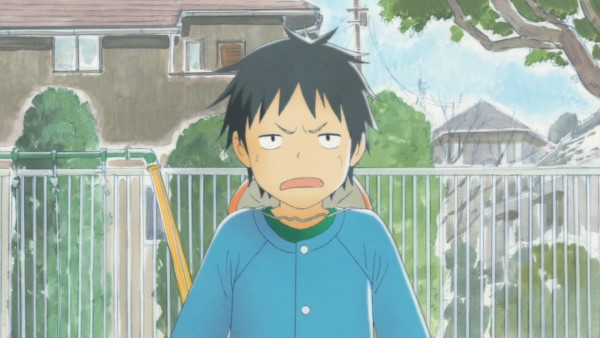
Remember this guy?
It turned out that Kouki had seen the whole thing, and he was no more pleased about it than I was. He also had the advantage of being a lot closer, and so I was treated to a scene which I had never expected: Kouki, who usually said very little, become highly irate and jumped in front of Keiko to protect her. He also took the opportunity to tell Biter in heated tones exactly what he thought of this behaviour.
Back then, my Japanese was best described as ‘fragmentary’. Fortunately, due to only being four years old Kouki’s wasn’t much better, so I could follow along with what he was saying pretty well:
“No!” (Kouki used ‘dame’, which is about as emphatic a no as you can get in Japanese). “You don’t do that! That’s not good manners! You say sorry to her!” And so on along the same lines for several minutes, complete with much finger-pointing and shaking of fists. I don’t know who was more surprised, me or Biter. Eventually Kouki took Keiko away to a safer location, and Biter was left standing there with a shell-shocked look on his face.
I would love to be able to say that this incident stopped Biter from biting anyone else, but it didn’t. In fact later that week he bit me, and the little sod drew blood too. However, Biter never bothered Keiko again, and he was always careful not to irritate anyone near Kouki either, so on balance I suppose it had a positive effect.
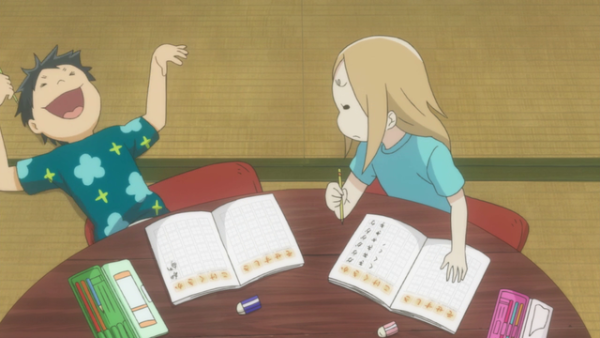
It would also be nice to imagine Kouki’s schoolwork improved too, but I’m fairly sure it didn’t.
You might be wondering why this episode made such an impression on me. Kids bicker and squabble every so often, and sometimes this involves tears – there’s not much we can do about that, and it’s arguable whether we even should. Kids like Biter aren’t particularly rare.
Kids like Kouki are, though. What impressed me most about all this is the way that he came to the same conclusions as me about what was going on and acted in the same way, without the benefit of 30-something years of life experience behind me. He didn’t need to think about what to do, or look around to see how other people were reacting – at four years old he saw a bully and did something about it straight away. Frankly, I wish more adults could do that.
Bullying is a problem in many schools, in Japan no less than other places – perhaps more. It was good to see someone stand against it.
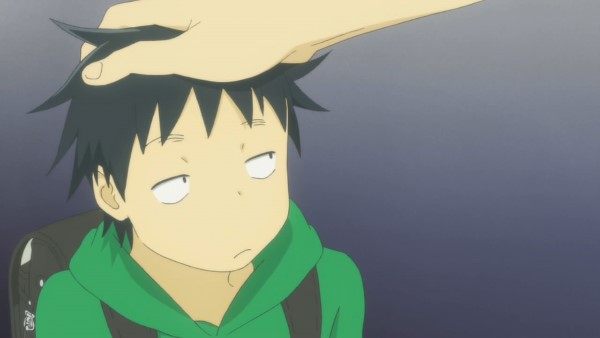
You done good, kid.

D’aww. I really enjoy reading little snippets of real life in Japan like this – partly because it makes a nice change, but also because it’s so easy to relate (and be entertained at the same time). If you have more stories like this up your sleeve, I’d definitely be happy to read about them.
LikeLike
Oh sure, I have plenty of stories. I’ll try to put more up from time to time. Not saying they’re all as kawaii as this, mind you…
LikeLike
A valuable insight into Japanese culture. I’ve been happy to drift along with the notion that Japanese people are subtly superior from birth; that their culture seeps into then from the get-go via some sort of magical osmosis and that everyone quickly becomes gracious, polite to a turn, and deeply ingrained with a sense of giri.
Conversely – the world of anime is where this is all reversed/released, letting characters be rude, arrogant, willful, saucy, violent or criminal, etc, as a fictional counterpoint to reality.
Not so.
I know.
Have your read Bruce Feiler’s “Learning to Bow”?
LikeLike
I must confess that I haven’t, actually.
To an extent, you’re not wrong – Japanese society puts a lot of pressure on people towards conformity, and this can be quite subtle at times. Calling it a kind of osmosis is not inaccurate. But as you imply, there is also a degree of deliberate instruction involved too.
LikeLiked by 1 person
This is the reason I don’t work with little kids. I would have slapped the kid so hard his head would spin if he bit me. I know that would be considered child abuse, but it would have been my instinctive reaction. You, at least, had the self control to refrain from that.
I wonder how Biter would have reacted if all the kids had gotten together and done that as a group?
LikeLike
I don’t know if it would have been considered child abuse, to be honest – I don’t know what Japanese ideas on the subject are, and personally I’m not convinced that sort of thing does lasting damage to a child. But violence isn’t my instinctive reaction in many situations, and I do have a degree of self control.
In addition to that, the position of a foreigner in Japan is always a bit delicate. Especially a foreigner working with children, and ESPECIALLY especially a foreign man working with preschoolers. People are always looking at you and talking about you, and every action is guaranteed to be scrutinised. It made me very aware of what I was doing and how it could be viewed. I can’t say I was thinking of that in the moment, of course, but I’m glad I didn’t do anything more extreme.
If all the kids had done that as a group, I’m fairly sure Biter would have had the most traumatic experience of his young life. The impact of that sort of social disapproval is hard to overstate in Japan, and even a three-year-old would be sensitive to it. I don’t know if it would or wouldn’t have altered his behavior permanently, but it would certainly have had an impact.
Unfortunately, I also think the chances of that happening are exceedingly slim. I don’t have a lot of experience with kids, but it seems that at three or four they’re still not confident in their actions and roles, and I can’t see a whole class of Japanese preschoolers doing that unless they had been drilled in it. This is one of the factors that made Kouki’s actions so remarkable.
LikeLike
Awww. That’s a great story, thanks for sharing that!
LikeLike
You’re welcome! Glad you liked it.
LikeLike